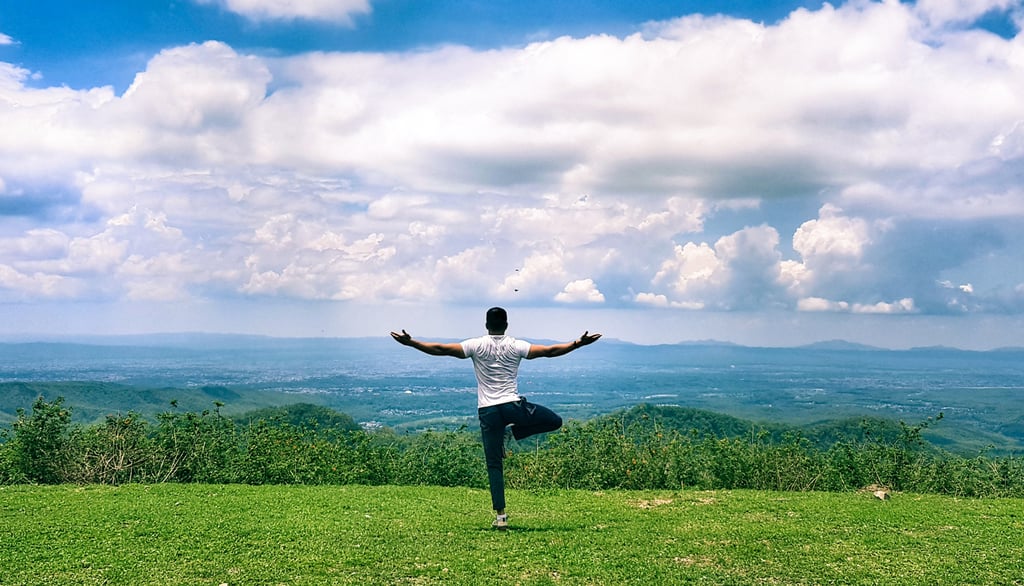From Stress to Serenity: 5 Effective Holistic Health Tips for Stress Management
We dig into the depths of science and spirituality to bring you 5 effective holistic health tips for stress management


Holistic Health Tips for Stress Management
1. Breathwork: The Power of Pranayama
Origin: Yoga and Ayurveda
Technique: Anulom Vilom (Alternate Nostril Breathing)
Source: "The Science of Pranayama" by Swami Sivananda
How to Practice:
Sit comfortably with your spine straight.
Close your right nostril with your right thumb.
Inhale deeply through your left nostril.
Close your left nostril with your ring finger, and release your right nostril.
Exhale slowly through your right nostril.
Inhale deeply through your right nostril.
Close your right nostril and release your left nostril.
Exhale slowly through your left nostril.
Repeat for 5-10 minutes.
Benefits: Anulom Vilom helps balance the nervous system, reduce anxiety, and promote mental clarity.
2. Mindfulness Meditation
Origin: Buddhist Teachings
Technique: Vipassana Meditation
Source: "The Art of Living: Vipassana Meditation" by William Hart
How to Practice:
Find a quiet place and sit comfortably.
Close your eyes and focus on your breath.
Observe the sensation of the breath entering and leaving your nostrils.
If your mind wanders, gently bring your attention back to your breath.
Practice for 10-20 minutes daily.
Benefits: Vipassana meditation enhances self-awareness, reduces stress, and promotes emotional regulation.
3. Herbal Remedies: Adaptogens
Origin: Traditional Chinese Medicine and Ayurveda
Herb: Ashwagandha
Source: "Adaptogens: Herbs for Strength, Stamina, and Stress Relief" by David Winston
How to Use:
Ashwagandha can be taken as a supplement in capsule form, or as a powder added to smoothies or teas.
The recommended dosage is 300-500 mg per day, but it's best to consult with a healthcare provider for personalized advice.
Benefits: Ashwagandha helps reduce cortisol levels, improve sleep quality, and enhance resilience to stress.
4. Physical Activity: Tai Chi
Origin: Ancient Chinese Martial Arts
Technique: Basic Tai Chi Movements
Source: "The Harvard Medical School Guide to Tai Chi" by Peter Wayne
How to Practice:
Stand with your feet shoulder-width apart.
Slowly shift your weight onto one foot and lift the opposite foot slightly off the ground.
Move your hands in slow, flowing motions as if moving through water.
Focus on your breath and maintain a relaxed, yet attentive state.
Practice for 15-30 minutes daily.
Benefits: Tai Chi promotes relaxation, improves balance, and reduces stress through mindful movement.
5. Sound Healing: Tibetan Singing Bowls
Origin: Tibetan Buddhism
Technique: Sound Bath with Singing Bowls
Source: "The Healing Power of Sound" by Mitchell L. Gaynor
How to Practice:
Sit or lie down in a comfortable position.
Place the singing bowl on a cushion or mat.
Gently strike the bowl with a mallet and let the sound resonate.
Focus on the sound vibrations and allow them to wash over you.
Practice for 10-15 minutes, especially during times of high stress.
Benefits: Sound healing with Tibetan singing bowls induces a deep state of relaxation, reduces anxiety, and enhances overall wellbeing.
Integrating Techniques into Daily Life
To maximize the benefits of these holistic stress management techniques, consistency is key. Here are some tips for integrating these practices into your daily routine:
Morning Routine: Start your day with a short session of Anulom Vilom or Vipassana meditation to set a calm and focused tone for the day.
Midday Break: Take a break from work to practice Tai Chi or listen to a sound bath with Tibetan singing bowls.
Evening Wind-Down: Incorporate Ashwagandha into your evening routine and spend a few minutes practicing mindfulness meditation to unwind before bed.
Conclusion
By combining the wisdom of ancient spiritual practices with modern scientific research, we can effectively manage stress and enhance our overall wellbeing. These holistic techniques not only help alleviate stress but also promote a deeper connection to ourselves and the world around us. Remember to give yourself the time and space to practice these techniques regularly, and you will begin to experience the transformative power of moving from stress to serenity.
Credits
Swami Sivananda, "The Science of Pranayama"
William Hart, "The Art of Living: Vipassana Meditation"
David Winston, "Adaptogens: Herbs for Strength, Stamina, and Stress Relief"
Peter Wayne, "The Harvard Medical School Guide to Tai Chi"
Mitchell L. Gaynor, "The Healing Power of Sound"
By adopting these practices and integrating them into your life, you can harness the power of holistic health to manage stress and live a more serene, balanced life.
In our fast-paced modern world, stress has become a common companion for many. However, with a holistic approach, combining the wisdom of ancient spiritual teachings and modern scientific research, we can transform stress into serenity. This blog will provide you with practical techniques backed by science and spirituality to help you manage stress effectively.
Understanding Stress
Stress is the body's response to perceived threats, triggering the "fight or flight" response. While this is helpful in short bursts, chronic stress can lead to numerous health issues, including anxiety, depression, and cardiovascular problems. Managing stress holistically involves addressing the mind, body, and spirit.